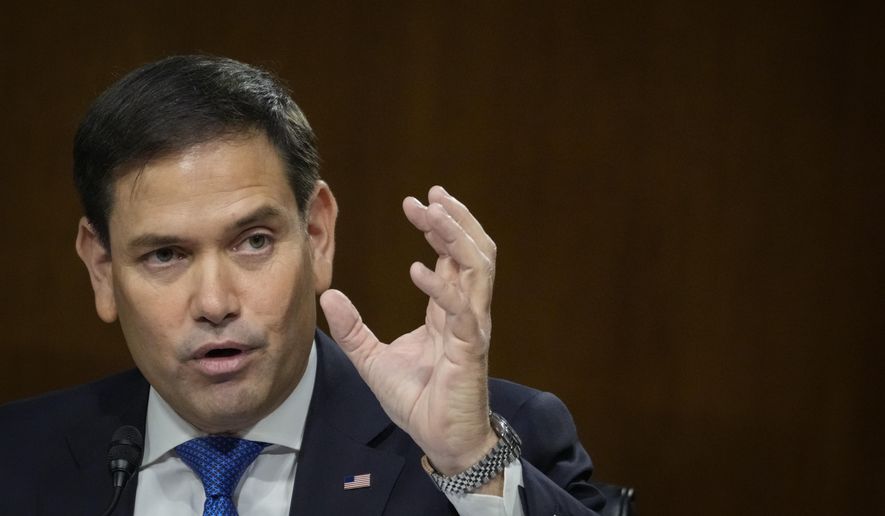Florida Republican Sen. Marco Rubio has blocked a confirmation vote for President Biden’s nominee to be ambassador to China over concerns the Biden administration is reverting to conciliatory policies toward Beijing.
Nicholas Burns, the nominee, is a European expert and career diplomat was picked for the key ambassadorial slot by Mr. Biden in September. Despite a long State Department career, Mr. Burns has had relatively little experience dealing directly with China or Asian issues.
Mr. Rubio announced the hold on a Senate vote, saying Mr. Biden’s choice reflects a failure by the administration more generally to appreciate the challenge posed by China’s Communist regime.
“Nicholas Burns has a long career in public service, but it is a career defined by the failure to understand the threat posed by the Chinese Communist Party,” Mr. Rubio said in a statement Wednesday. “In fact, Burns displayed no remorse or concern about his current business relationships with nationless corporations operating in China.”
The Florida Republican did not elaborate. A spokeswoman for Mr. Rubio also declined to provide information about Mr. Burns’ links to corporations doing business in China.
At the White House, press secretary Jen Psaki brushed aside questions about Mr. Burns’ business ties to China after he left government service and said he is “eminently qualified” for the ambassador post.
“He’s somebody who could effectively do the job from the first day,” she told reporters. China “is a country where we vitally need an ambassador at a time where we have a lot of business engagement and follow-up work to be done.”
The parliamentary move comes just days after Mr. Biden and Chinese President Xi Jinping held a lengthy virtual summit that Mr. Biden focused largely on putting in guardrails to keep the relationship between the two powers from worsening.
Mr. Burns’ nomination was approved by the Senate Foreign Relations Committee after a hearing in October but is now being held up from a full Senate vote under rules that allow individual senators to place a hold on nominees.
Mr. Rubio, a senior member of the Foreign Relations Committee, said Mr. Burns is the type of nominee he expected from Mr. Biden “given this administration’s weak approach toward China, including lobbying against my bipartisan Uyghur Forced Labor Prevention Act.”
“The last thing we need is another caretaker of American decline in the room with the Chinese Communist Party,” he said.
The block of Mr. Burns’ nomination drew a social media rebuke from White House deputy press secretary Chris Meagher.
“We need senators who are not going to slow down critical nominations for made-up reasons, as [Mr. Rubio] and some of his GOP colleagues are doing in a historic and unprecedented way,” Mr. Meagher tweeted Thursday.
Earlier, Mr. Rubio told Fox Business News that the United States needs “diplomats that are going to be strong and are going to go to China and not get invited to their parties … but actually be very strong about expressing our outrage.”
Mr. Rubio is known as a strong advocate of tougher U.S. policies to China.
In 2018, the senator successfully blocked the nomination of another career State Department official, Susan Thornton, who was picked for the key post of assistant secretary of state for East Asian and Pacific Affairs.
Mr. Rubio blocked that nomination after Ms. Thornton provided what he said were misleading or evasive answers during committee testimony, comments that appeared to undermine U.S. support for Taiwan and failed to stand up to Chinese efforts to promote its authoritarian governing system abroad.
During an Oct. 20 Senate hearing, Mr. Burns said the Biden administration’s approach to China will focus on working with allies to confront China.
“There’s no question in the 21st century … [that] China is the greatest threat to the security of our country and of the democratic world,” Mr. Burns said.
Mr. Burns also said he favors deepening the U.S. relationship with Taiwan under the 1979 Taiwan Relations Act, and supported congressional efforts regarding China to “speak out and legislate when necessary and to sanction when necessary.”
But asked about the estimated 375,000 Chinese students currently in the United States, Mr. Burns said the U.S. is better off having them here so they can learn about democracy firsthand.
Critics say China’s government has used some students studying in the United States for its propaganda and influence operations. The state-backed Chinese Students Associations in some U.S. universities have conducted pro-China activities aimed at limiting criticism of human rights abuses.
Mr. Burns also testified that China has been stonewalling the international community on the origin and the earliest days of the COVID-19 pandemic and that Beijing needs to help investigate how the virus originated. Mr. Burns said he believes Mr. Biden has adopted a very tough approach to Beijing, an approach that has included at least 15 sanctions or executive orders aimed at limiting Chinese government influence activities.
• Bill Gertz can be reached at bgertz@washingtontimes.com.




Please read our comment policy before commenting.